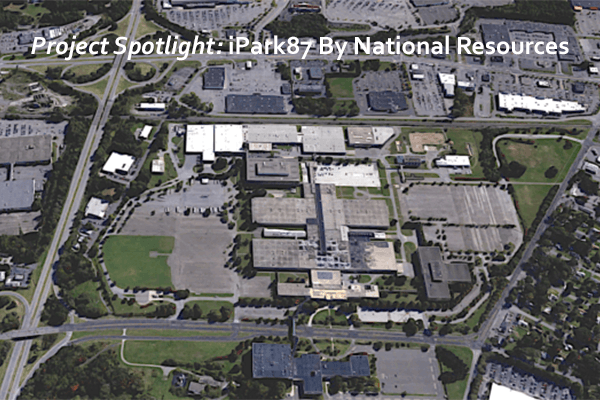|
RCBJ-Audible (Listen For Free)
|
Rockland Continues To Struggle With Large Vacated Corporate Campuses
By Tina Traster
When companies like IBM or Pfizer vacate large corporate campuses that have thrived for decades and become reliable sources of taxes and employment for a community, not to mention a brain trust, their disappearance creates a deep and painful void — but also opportunity depending on how a redevelopment plan is executed.
How long and with what methods it takes to reinvent vast campuses holds lessons for developers, planners, elected officials, investors, companies and communities. Successful reincarnations are a bright source of economic development; they breathe life and excitement into a town, even a region. Campuses that sit fallow and rot, become a burden and a blight.
Finally, after three decades of flailing, iPark87, the former IBM Kingston West Campus campus in the Town of Ulster, is on track to become a vital hub of education and technology and housing, due to strategic collaborations that brought together a partnership between a private developer and government. The campus is being reinvented by Joe Cotter and his deep-pocketed Greenwich, CT-based National Resources, which has been transforming industrial campuses in Yonkers and in the Hudson Valley for the past several years including iPark84 in the Town of East Fishkill, a former IBM plant, and film production campuses in Yonkers.
“This campus was an 800-pound gorilla,” said Mike Oates, President and CEO of the Hudson Valley Economic Development Corporation, a linchpin in facilitating the deal among the town, county, the former owner, and National Resources for iPark87. “This campus was massively underutilized, it struggled to find tenants, the owner wasn’t finding tenants. A portion of the campus was in foreclosure.”
The HVEDC, along with Ulster town and county officials and other partners have worked with National Resources to articulate a vision to transform the campus after three decades of faltering. The vision embodies a campus that promotes a clean energy economy and a complex that integrates education, housing, and the supportive elements that come along with creating a campus culture, including retail, restaurants, and entertainment.
The Greenwich, CT-based developer National Resources in April purchased the IBM Kingston West Campus from Ulster County, a 100-acre site with 600,000 square feet of building space and 60 acres of undeveloped parcel. The plan is to move soccer fields from the East Campus to the 60-acre parcel. The county will receive $7.34 million from National Resources, representing a purchase price of $6.8 million to be paid in equal installments over 10 years plus $10 million in back taxes and unpaid utility bills owed by former owner Alan Ginsberg.
National Resources previously purchased the former 200-acre IBM East Campus facility and is renovating one million square feet of existing buildings for commercial and industrial use, including sound stages for film production. In addition, National Resources plans to build two million square feet of warehouse and commercial space along with 800 units of workforce housing on the site off Exit 19 of Interstate Highway 87 in the Town of Ulster, just north of Kingston. In addition to closing on the sale of the West Campus, Ulster County also executed an agreement to sell to National Resources the last foreclosed four-acre parcel in the East Campus that has the non-operational powerhouse that cooled and heated the campus. National Resources plans to use this parcel for a brewery, a distillery, and a food hub.
The company plans to cover at least $7 million for an environmental cleanup cost.
“iPark87 is a roadmap, a model for other challenging projects that can be successfully developed,” said Dan Ahouse, President of Stockade Strategies LLC, which worked on behalf of the developer to bring this project to light. “These projects are difficult. But worth it.”
The iPark87 tale bears watching as large campuses in Rockland County struggle to reinvent. Pfizer sold its long-time pharmaceutical campus in 2015 for $40 million to Industrial Realty Group, LLC (IRG), a real estate development and investment firm. In 2021, the campus rebranded to Hudson Valley iCampus, which is not related to National Resources and its iPark brand. The Hudson Valley iCampus has been vying to attract high tech and pharmaceutical tenants to its 2.1 million-square-foot campus on 401 North Middletown Road in Pearl River for eight years but the 207-acre campus is still nearly half vacant. At one point, Hudson Valley iCampus flirted with the idea of integrating a residential component on the campus but the idea was tabled. On the upside, the campus recently inked its latest lease of 57,197 square feet to Strides Pharma, Inc., a chemical storage company.
Rockland County was once a thriving hub for pharmaceutical companies, just as Hudson Valley towns once hosted IBM campuses. The former Novartis campus in Suffern is slated to become a warehouse distribution center. The Avon facility, also in Suffern, will soon be vacant as Avon shifts its offices overseas. One parcel, the former Avon Nail Polish testing lab has sold for $1.9 million, and will likely require extensive environmental remediation. The former 106-acre IBM campus, which later became the HNA Palisades Training Center, a hotel and convention center, has been shuttered for nearly three years and is now the target of eminent domain by the Town of Orangetown.
Oates says the key to the iPark87 project’s success is its holistic approach.
“This project is the result of sympathetic partnerships,” said Oates. “We’ve worked closely with elected officials, the County Executive, the governor, Empire State Development. You have to have all these institutions and entities moving together, as a united front, with a shared vision, or it can’t be done.”
Ahouse and Oates agree that having a well-resourced, seasoned developer with a proven track record helps. But developments of this scale require community buy in, and Ahouse says Ulster Citizens, a community group, worked alongside the rest of the team to create a vision for the property.
“A developer has to fight for every bit of support or the model doesn’t work,” said Ahouse. “A project has to be in complete alignment with the goals and priorities of the community. That is the secret sauce.”
Garnering support is an insurance policy against community opposition down the road. But developers also need to express a vision that decisionmakers get behind.
“The reason some projects start and die, or wither on the vine, is that it takes too long to be redeveloped,” said Ahouse. “Time is money. The longer it takes, the more expensive it becomes. Projects at some point, don’t make sense to build.”
He added, “Having a developer with a proven track record helps properties rise from the ashes. It also helps attract tenants to the property.”
With iPark84 in East Fishkill at near capacity, National Resources is hoping to redirect demand to the iPark87 campus.
The Canadian battery company Zinc8, which received $9 million in state incentives, is in negotiations to lease 150,000 square feet at iPark87, with plans to double its size with a full buildout. The company plans to bring 500 new jobs to the county. Another battery company, Cadenza, is also in discussions to take space. Also, Archtop Fiber, a fiber broadband company funded by an equity partner for $350 million, has leased 50,000 square feet.
In May, Gov. Kathy Hochul held a press conference in the Town of Ulster to announce that iPark87 had received a $10 million Restore New York state grant for renovations of the campus. At the time, Hochul said, “This is going to rehab two of our nearly 70-year-old decaying buildings and turn them into a state-of-the-art innovation hub.”
Ulster County is planning to create a Workforce Innovation Center at iPark87. County Executive Jen Metzger has said federal legislation under President Joe Biden’s administration including the Inflation Reduction Act, the bipartisan Infrastructure Investment and Jobs Act, and the CHIPS for America Act, supports a transition to clean energy.
To capitalize on this shift, local workers will need training.
Ulster County is working with leaders from SUNY New Paltz, SUNY Ulster and Ulster BOCES to help design the concept for a Workforce Innovation Center, with the county relocating its Office of Employment and Training, Ulster County Tourism, and the Department of Economic Development into a single 40,000-square-foot facility at iPark87.
Finally, workforce housing is at the heart of the plan.
iPark87 is planning 880 units in 17 new buildings along Boices Lane and a “mobility hub” that will connect the campus to major commuter centers. National Resources in in front of the Town of Ulster Planning Board for a Master Plan and site plan for the housing.
“What this campus needs, overwhelmingly needs, is market-rate housing of studio, one and two-bedroom apartments to make it a walkable community where academic and technology companies work in partnership and people have a place to live.” Oates said.
















